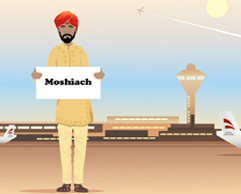
Waiting for Mashiach
How do we properly fulfill our halachic obligation of anticipating and waiting for Moshiach? Is this something tangible and relevant? Many have no idea what this means...

I recently heard an amazing parable at a local shiur I went to. The Rabbi relayed a parable by Rav Yerucham Levovitz, Mashgiach of the Mirrer Yeshiva. Rav Levovitz spoke about one of the Rambam’s 13 Principles of Faith- the principle of waiting for Mashiach. It states: “I believe, with complete and perfect faith, in the coming of Mashiach, and even though he tarries, I will wait for him.”
Rav Levovitz wanted to know what the practical application of this mitzvah was. Can a person actively wait for something to happen? What should he do; sit around all day and simply wait, as if waiting for a phone call? What about his daily responsibilities? Should he say, “Sorry, honey, I can’t help you with the kids tonight. I’m busy waiting for Mashiach.” Can you imagine the backlash that poor husband would suffer?
On the other hand, if we are constantly focused on what we need to accomplish each day, we can easily lose sight of the collective goal; the World to Come. Once in a while, a thought might slip into our busy brains, reminding us of the mitzvah of anticipating the Mashiach. If we are indeed so lucky as to have such a thought, what do we do with it? Maybe some of us might say a prayer aimed at hastening the  Redemption. Others might get a longing feeling in our hearts.
Redemption. Others might get a longing feeling in our hearts.
But, is this really enough? Is the mitzvah of waiting for Mashiach meant to be a vague and fleeting thought? For those people who are constantly thinking about the Redemption and asking Hashem to bring the Mashiach, what are they practically doing to achieve this mitzvah? Sure, every mitzvah brings the Redemption that much closer. However, they don’t seem to be included in this one Principle, which states that waiting is a mitzvah in itself.
So what is the Rambam trying to tell us?
Rav Levovitz came up with a brilliant explanation: Imagine that your parents are coming into town, and you have to meet them at the train station… (We’ll use the updated version of the airport, as the Rabbi of the shiur explained.)
On second thought, if you’re not on great terms with your parents, substitute a person that you would actually be excited to see. In my case, that would be anyone I managed to coerce into lugging a 70 pound suitcase loaded with stuff I ordered online across the Atlantic. In most cases, that would be my husband. Fine. As an example, let’s say I am excited to see my husband return home from a two week trip- but not really because I missed him! These kids of mine (G-d bless them) were driving me CRAZY! “Please, take them!” I tell him, “I’m running away!”
Sorry. Maybe that’s not the best example. Okay, try to recall a time during your childhood when your grandparents were visiting from out of town. How excited were you to go to the airport? I used to love the airport, before the TSA creeps declared Martial Law in the terminals. Do you remember running up and down that big room where the passengers come out from? I have no idea what it’s called. With each face that you saw, you experienced an instant roller coaster of excitement and letdown, until finally, your grandparents made their grand entrance. I don’t know about you, but to me it seemed like my grandparents were always the last ones out!
The joy and excitement I felt as a kid when I ran to and nearly toppled my grandparents over was one of the best memories of my childhood.
Now, let’s imagine the opposite scene. Rav Levovitz proceeds to describe what would happen if we weren’t at the airport in time to greet our grandparents. What if our parents had decided, “Well, the flight lands at 1:00. We’ll leave at 12:30, and be there by 1:15. They surely won’t be checked out by then!” What happens? There’s an unexpected traffic jam on the highway, and of course you didn’t know about it, because Waze didn’t exist yet. (Don’t you just love Waze?) Now, the whole family is stuck in traffic, and the kids are going crazy with boredom and anxiety to see Grandma and Grandpa.
Meanwhile, at the airport, the grandparents are super-excited to see their beloved grandchildren. As they get off the plane and walk to the baggage terminal, their excitement is building. As they go through the long lines of customs, their annoyance, along with their excitement, is growing exponentially. Finally, after many long and painful hours of cramped legs and being served food that most people wouldn’t feed their dog, they see the double doors of the room that I don’t know the name of. Let’s call it the Greeting Room.
Grandma and Grandpa are practically jumping out of their wrinkled skin as they hear squeals of children on the other side of the door. They do their best to increase their walking pace from painfully slow to slow, and try to shove past each other through the double doors with big smiles on their faces and their arms open wide. “We’re here!” they exclaim, scanning the room for their grandkids.
Quickly, almost instantly, their smiles turn upside down, and their excitement deflates faster than a balloon with a pinprick in it. No one is there to greet them. Safta (grandma) is near tears, and Saba (grandpa) is pretty freakin’ mad that his kids couldn’t manage to make it on time to pick them up.
By the time the family mobile pulls up to the terminal, everyone’s fed up. S&S are hungry and tired, and the kids have had it after being in the car for over an hour. What should have been a happy reunion ended up being a sour reunion.
How many people would willingly sit at home while their parents arrived at the airport (assuming they’re on good terms with each other?) Most of us wouldn’t dream of it! Our parents expect us at the airport, waiting front and center for them to make their grand entrance- and rightfully so. How much respect would we be showing our parents if we intentionally waited at home?
What message would we be telling our parents? Could it be, “You’re just not important enough for me to make the effort to meet you at the airport.”
By now, I assume you’ve figured out the message of the parable. So many people want the Mashiach to come, but what are they doing about it?
Rav Levovitz explains that the act of arriving at the airport early is in itself the mitzvah of waiting for Mashiach!
Rav Levovitz asked, “How will the Mashiach feel when he arrives in Israel and you’re not here to receive him?”
How will you feel?
Don’t wait any longer to come home! Very soon, G-d willing, the ultimate family reunion will happen. Don’t you want to be a part of it?








1/06/2015
We must await him-yes- but where does it say he’ll arrive in Israel?
how do you know Moshiach will arrive in Israel? He could "arrive" anywhere, anytime.
1/06/2015
how do you know Moshiach will arrive in Israel? He could "arrive" anywhere, anytime.